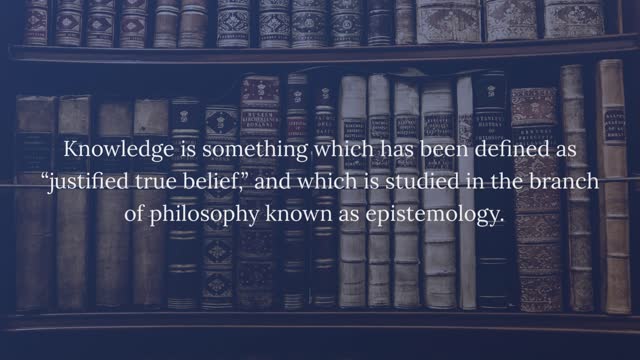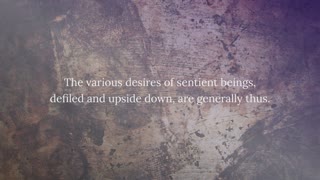Premium Only Content

Buddhism: Knowledge vs. Wisdom
Knowledge is something which has been defined as “justified true belief,” and which is studied in the branch of philosophy known as epistemology.
The quest for knowledge knows no boundaries. There is no limit to pursuing knowledge, because knowledge is clearly different from “feeling sure” about what exists or about the course of events.
Most philosophical debate on the subject centers on the nature of truth and on what counts as appropriate evidence for claiming to know something. In Buddhist teaching, there are three sources of knowledge: Inference, Perception, and Experience.
Knowledge of how things work is quite different from realization, which is wisdom, which is insight, which wants to see why it works, and how it works.
Wisdom is so much more than knowledge. Knowledge is the answer to the question “How?” Wisdom is investigation of the answer to the question “Why?”
Knowledge can answer a query about function, result, and purposes: wisdom does not provide an answer, but is realizing why such a question has arisen.
And in that realization of the question, there is no search beyond because insight has solved the problems, dissolved the conflict and ended the search.
Thus, where knowledge searches outside, wisdom ceases at the insight into the question.
The Buddha was once asked as to whether without sensuous pleasure life would be endurable; without belief in immortality, man could be moral and without worship of a God, man could advance towards righteousness.
The Buddha replied in the affirmative and mentioned that these ends could be attained by knowledge; knowledge alone was the key to the higher path, the one worth pursuing in life; knowledge was that which brought calmness and peace to life, which rendered man indifferent to the storms of the phenomenal world.
Source: Food for the Thinking Mind by K Sri Dhammananda
-
 0:56
0:56
Buddhist Mind
4 years agoBuddhist Parable 33: Delusion
1701 -
 0:23
0:23
EntertainmentVideos
4 years agoBuddhism
12 -
 1:43
1:43
HSW Quiz Videos
4 years agoHSW General Knowledge Trivia 2
9.33M1 -
 0:31
0:31
Buddhist Mind
4 years ago $0.02 earnedBuddhism: 3 Characteristics in Everything
126 -
 2:46
2:46
Buddhist Mind
4 years agoAttaining Buddhahood | Buddhism
58 -
 0:04
0:04
USAMFBTV
4 years agoKnowledge is power
76 -
 1:43
1:43
HSW Quiz Videos
4 years agoHSW General Knowledge Trivia 1
7.39M -
 2:01
2:01
KGTV
4 years agoWords of Wisdom this Election
54 -
 1:00
1:00
Redwhiteblue2017
4 years agoSocial Security knowledge
175 -
 1:18
1:18
Virtue Heroes
4 years ago $0.01 earnedThe Heroic Way of Wisdom
2071